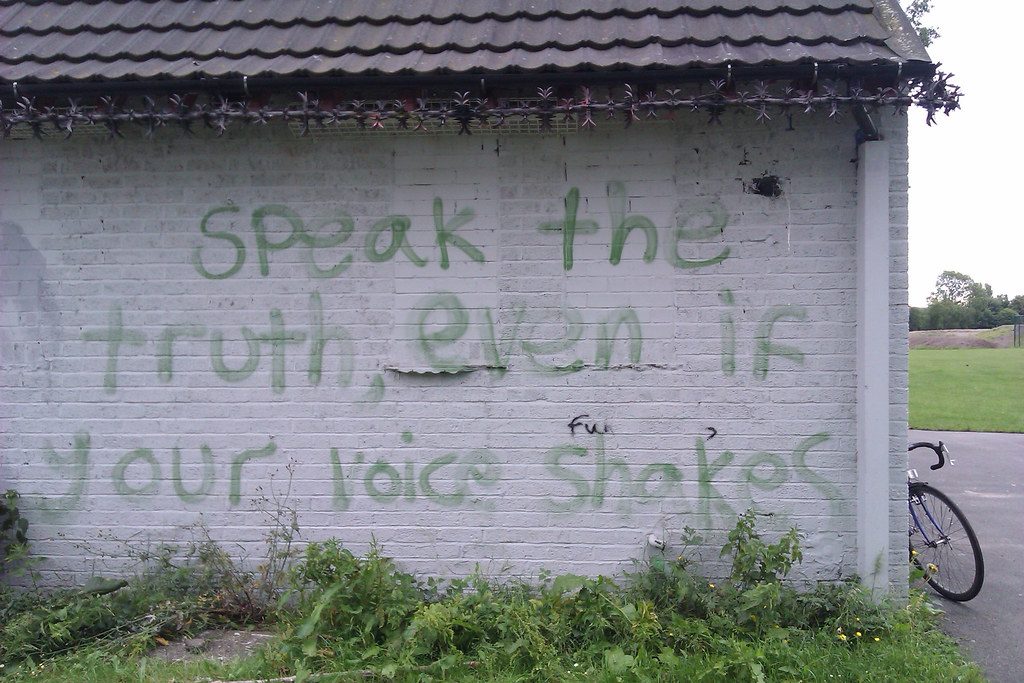The readings for the Saturday in the Octave of Easter can be found here: Acts 4: 13-21, Mk 16: 9-15.
The readings for the Second Sunday of Easter can be found here: Acts 4: 32-35, 1 Jn 5: 1-6, Jn 20: 19-31.

To hear Mary Magdalene’s story you have to go to Mass on Monday, Tuesday, and Saturday this week. Even the lectionary is biased to tell the stories of men over women. But there are deep connections between the Saturday and Sunday readings this week, and they are worth probing and reflecting upon.
It is impossible for us not to speak about what we have seen and heard.”
Acts 4:20
“She went and told his companions who were mourning and weeping. When they heard that he was alive and had been seen by her, they did not believe.”
Mk 16: 10-11
The Saturday readings center the stories of Peter, John, and Mary Magdalene as they use their voices to speak to their direct experience of the living God. Peter and John refuse to obey human orders to be silent. Mary Magdalene speaks up, even though the companions of Jesus do not believe her. In both vignettes, speaking up takes courage, resolve, and involves risk. How did they have such clarity? How did they have such courage?
We don’t know details, of course. But in both cases they are speaking from the authority of their own experience. Peter and John were “uneducated, ordinary men” who were making waves, and who were therefore “ordered not to speak or teach at all.” Mary Magdalene had seen the risen Lord and used her voice to share the good news of what she had seen.
These readings invite us to reflect on how we interpret human experience in our moral theology, and whose experiences “count” in Catholic ethics today. For example, when the CDF issued their 3/15/21 Responsum, did they attend sufficiently to the experiences of gay families and the blessings they bestow on our faith communities? What would it mean to be like Peter, John, and Mary Magdalene in our response to the Responsum? Whose voices do we need to listen to today? Who is taking a risk to speak up and how can we amplify their voices for the common good?
In the Sunday readings, we hear motifs of the equal distribution of goods (Acts 4: 32-35), the greeting of “Peace” (Jn 20), and the forgiveness of sins. We also have the story of Thomas, who is unable to believe until he sees and touches the risen Lord himself (Jn 20). Two prominent themes in John’s gospel narrative are “belief” and “love,” which always go hand-in-hand.
Teachers love having a “Thomas” in the classroom– the student who regularly asks questions, challenges assumptions, invites classmates to think of an issue from more than one perspective. Thomas wants more evidence. Thomas wants the evidence to cohere logically with the assertions made by authority figures. Thomas doesn’t trust you. Thomas wants to see for himself.
“Unless I see the mark of the nails in his hands and put my finger into the nailmarks and put my hand into his side, I will not believe.”
Jn 20:25
In our church today, sometimes Thomas is embodied by clerical leaders who refuse to listen to the experiences of women and queer Catholics who are testifying to what God is doing in their lives. Gay couples are saying “Put your finger here and see my hands, and bring your hand and put it into my side.” See these wounds. But don’t stop there. Sit with us at our family table. Share our bread. Share our stories. “Do not be unbelieving, but believe.”
Experience has two sides. We speak with conviction from what we know, what we have seen ourselves. There is power in speaking from our experience. But my experience is limited, partial, wounded by sin, as is yours. We all have blind spots. We all experience formation in a broken world. We cannot craft Catholic theological ethics without drawing on our interpretation of human experience. But neither can we be flippant about how we do so.
What we need is a community built on trust in which all stories can be welcomed, appreciated, included. In which we believe one another, even though ‘my experience’ may be different from yours. Thomas comes to believe because he can see the wounds of the risen Christ. As we read the Saturday and Sunday readings together, we can reflect on how we are invited to use our voices to speak about our experiences, and even our wounds, so that others may believe.


